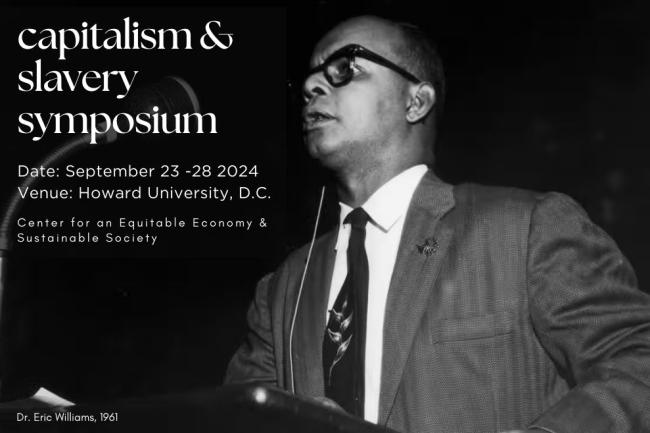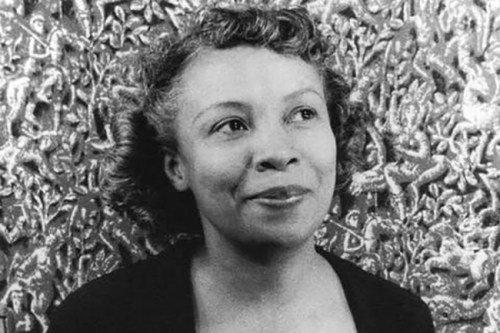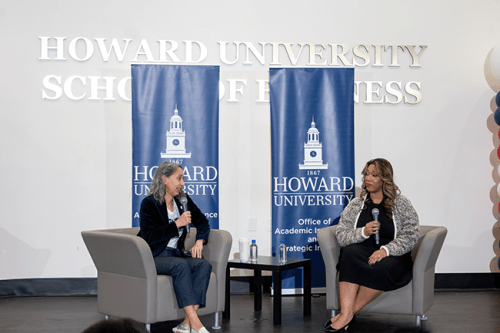The Howard University Center for an Equitable Economy and Sustainable Society (e2s2) is proud to announce a symposium celebrating the 80th anniversary of Eric Williams’, Ph.D., landmark publication of “Capitalism and Slavery.” While writing the book, Williams was a professor at Howard University, teaching classes in the political science department. This seminal text, which transformed how scholars understand the relationship between the Transatlantic and the rise of capitalism, will be the focus of a bi-national conventions taking place from September 16-22 in Havana, Cuba and again in Washington D.C. from September 25-28 in Howard University’s School of Business Auditorium.
Michael Ralph, professor and chair of Howard University’s Department of Afro-American Studies, called commemorating the 80th anniversary of CAPITALISM & SLAVERY a “special privilege” for the University.
“Thanks in large part due to Dr. Williams’ landmark text, no credible scholar can try to explain the history of capitalism without the role of slavery in shaping investment strategies, accounting practices, supply chain, time, labor, work-discipline, incentives, insurance, and countless other features of capitalist enterprise.”
During his career, Williams held the position of assistant professor in Howard’s Department of Social and Political Science between 1939 and 1946, after earning his doctorate from Oxford University in 1938.
While at Howard, Dr. Williams conducted additional research for his doctoral thesis, ‘The Economic Aspect of the Abolition of the West Indian Slave Trade and Slavery,’ transforming it into Capitalism and Slavery, which re-shaped scholarly conversations and public knowledge about the massive contribution of human bondage to the tremendous wealth of Europe, and illuminated the financial, social, and political legacies of slavery and colonialism. Capitalism & Slavery remains unparalleled in its influence on thinking through these dynamics even eighty years later, marking the occasion of this symposium.
The symposium will convene leading scholars to explore the enduring impacts of Williams’ research and its relevance in contemporary discussions on economics, politics, race, and history. Sessions will include keynote addresses, individual presentations, panel discussions, and receptions at various embassies, aimed at fostering a deeper understanding of the enduring historical and economic complexities and legacies of liberation in Williams’ work.
“It is crucial to note that the wealth generated by the Transatlantic slave trade did not vanish with Emancipation,” Williams said. “In fact, its value has increased dramatically and compounded over the centuries. So, what has happened with that capital — and what should happen with that capital — remains central to public policy debates.”
###
About The Center for an Equitable Economy and Sustainable Society:
The Center for an Equitable Economy and Sustainable Society (e2s2) is a multidisciplinary research center established to address racial and economic inequities. e2s2 is expressly concerned with the role that social difference plays in shaping who has access to capital and how people are governed. By insisting that political and economic transformation be viewed through the lens of sustainability, the center maintains an abiding interest in how social practices and institutions strengthen or diminish climate health. e2s2 gains momentum from broader interest at Howard University in pioneering methods for gathering and analyzing data relevant to asset inequality, criminal justice reform, climate, and health in policy and in imaginative responses to pressing social problems.
The Center is also part of a consortium formed for the reimagination of capitalism, a multi-institutional effort jointly funded by the Hewlett Packard Foundation and the Omidyar Group (see Howard Launches Multidisciplinary Research Center, Joins $40M Effort to Reimagine Capitalism). Dr. Michael Ralph, Chair and Cameron Schrier Professor in the Department of Afro-American Studies at Howard University, is the Founding Director of e2s2. He leads the Center alongside e2s2 Co-Director, Dr. Jevay Grooms, who is a Faculty Research Fellow at the National Bureau of Economic Research (NBER) and a Board Member of the National Economic Association (founded in 1969 as the Caucus of Black Economists) and FAIR Health. e2s2 has several research initiatives and partnerships in the Howard University community and beyond.
About Dr. Eric Williams:
Eric Williams, Ph.D., was a distinguished historian, educator, and statesman who made significant contributions to both Howard University and his home country of Trinidad and Tobago. Beyond the academic sphere, Dr. Williams played a pivotal role in the political evolution of Trinidad and Tobago. He founded the People's National Movement (PNM), ascending to the nation’s highest office in 1962. As the country’s first Prime Minister, Williams led the nation to independence from British colonial rule. Under his leadership, Trinidad and Tobago embarked on a path of social and economic development with a strong emphasis on education, which Williams viewed as critical to nation-building and self-determination. His legacy is celebrated in both academic and political circles, as he remains a towering figure in Caribbean history, economic history, and post-colonial studies.
If you would like to participate in the symposium as a general attendee, we kindly invite you to register here: https://app.smartsheet.com/b/form/70720dbc68594b1d9f389a373ab1491f
Media Contact: Brittany Bailer, Senior Communication Specialist, brittany.bailer@howard.edu





